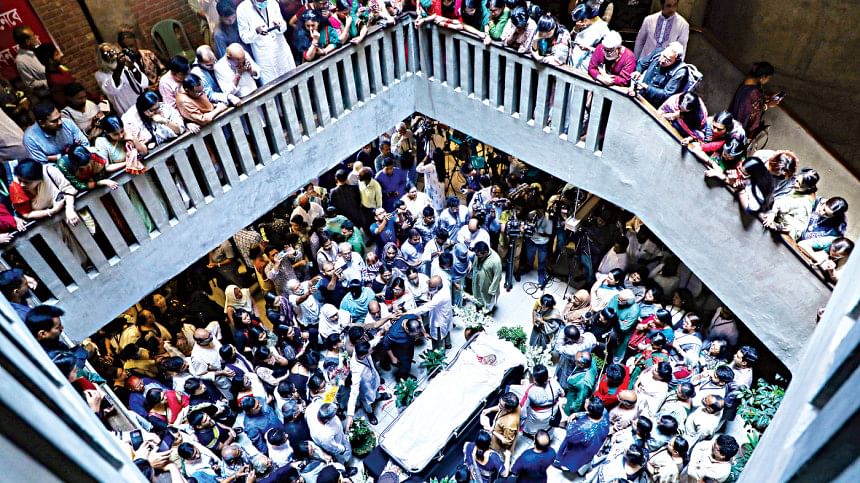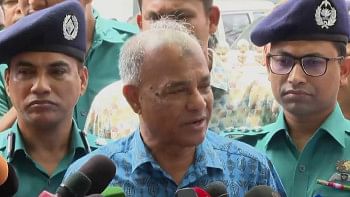Nation pays glowing tributes to Sanjida Khatun

The nation yesterday paid glowing tributes to Dr Sanjida Khatun, the president of Chhayanaut and a pioneer of cultural movement in Bangladesh.
The Ekushey Padak-winning Rabindra Sangeet exponent passed away on Tuesday. She was 91.
Her mortal remains were brought to Chhayanaut around 12:30pm. Music devotees started gathering at the Chhayanaut building since morning to bid her a final farewell.
As her body arrived, everyone present sang the Rabindra Sangeet "Amar Mukti Aloy Aloy". The platform where her body was placed was soon covered with floral tributes, honouring her legacy.
On the tribute stage, songs were performed by Bulbul Islam, Shaheen Samad, Laisa Ahmed Lisa, Partha Tanveer Naved, Ruchira Tabassum, and many others.
Chhayanaut's vice president and essayist Mofidul Hoque said, "The grand celebration of Pahela Baishakh that we see today was shaped by the efforts of Sanjida Khatun. She created a bridge between Chhayanaut and our society. She continues to live on in the hearts of many."
The tribute ceremony at Chhayanaut's courtyard concluded with the rendition of "Aguner Poroshmoni" and the national anthem.
To pay their respects at Chhayanaut, Fahmida Khatun, Ramendu Majumdar, Khurshid Alam, Shaheen Samad, Selina Malek Chowdhury, Iffat Ara Dewan, Minu Hoque, Khairul Anam Shakil, Shamim Ara Nipa, Shibly Mohammad, and many others were present.
Several organisations also paid tribute with flowers, including Surer Dhara, Bangladesh Muktijuddha Mancha, Dhaka Theatre, Liberation War Museum, and Kanthashilon, among others.
From Chhayanaut, the coffin was taken to the Department of Bangla at Dhaka University. At 2:30pm, the coffin was taken to the Central Shaheed Minar, where people from all walks of life will bid their final farewell until 4:00pm.
Subsequently, the coffin was taken to the BSMMU morgue. However, the family of the deceased has stated that no further decisions have been made regarding the next steps.
Born on April 4, 1933, Sanjida was raised in a household of intellect and creativity. Her father, National Professor Kazi Motahar Hossain, was a renowned academic, while her mother, Sajeda Khatun, was a homemaker.
She completed her undergraduate studies in Bangla Language and Literature from the DU in 1954 before pursuing a master's degree at Visva-Bharati University in India. In 1978, she earned a PhD from the same institution.
While academic circles were only one aspect of her vast contributions, music was her soul's calling. A disciple of legendary musicians such as Sohrab Hossain, Shailajaranjan Majumdar, Abdul Ahad, Kanika Bandyopadhyay, and Nilima Sen, she mastered Rabindra Sangeet, Nazrul Sangeet, and Bengali folk music. Her passion led her to co-found Chhayanaut in the early 1960s, an institution dedicated to preserving and promoting Bengali music and cultural traditions.
During the Liberation War, she played a crucial role in forming Bangladesh Mukti Sangrami Shilpi Sangstha, using music as a tool of resistance against oppression. Throughout her life, she remained steadfast in her belief that culture was not merely an aesthetic pursuit but a medium for social change.
Her involvement in the Bratachari Movement, a cultural and social reform initiative led by artist Quamrul Hassan, further highlighted her dedication to progressive ideals. She also stood at the forefront of the Language Movement in 1952, standing against oppression and advocating for the right to Bangla language and identity.
Honoured with numerous accolades, she received the Ekushey Padak, one of country's highest civilian awards, for her outstanding contributions to music and culture. In 2021, her influence crossed borders as she was awarded India's Padma Shri, the country's fourth-highest civilian honour.

 For all latest news, follow The Daily Star's Google News channel.
For all latest news, follow The Daily Star's Google News channel. 



Comments